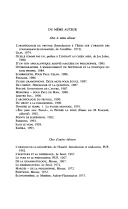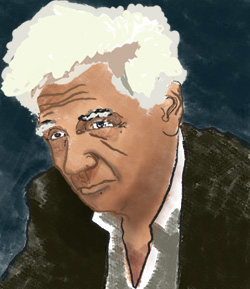Œuvres

Spectres de Marx
Jacques DerridaJacques Derrida citations célèbres
Jacques Derrida: Citations en anglais
Wear and Tears (tableu of a ageless world)
Specters of Marx (1993)
Contexte: The time is out of joint. The world is going badly. It is worn but its wear no longer counts. Old age or youth-one no longer counts in that way. The world has more than one age. We lack the measure of the measure. We no longer realize the wear, we no longer take account of it as of a single age in the progress of history. Neither maturation, nor crisis, nor even agony. Something else. What is happening is happening to age itself, it strikes a blow at the teleological order of history. What is coming, in which the untimely appears, is happening to time but it does not happen in time. Contretemps. The time is out of joint. Theatrical speech, Hamlet's speech before the theater of the world, of history, and of politics. The age is off its hinges. Everything, beginning with time, seems out of kilter, unjust, dis-adjusted. The world is going very badly, it wears as it grows, as the Painter also says at the beginning of Timon of Athens (which is Marx's play, is it not). For, this time, it is a painter's speech, as if he were speaking of a spectacle or before a tableau: "How goes the world?-It wears, sir, as it grows.
“I speak only one language, and it is not my own.”
Source: Monolingualism of the Other: or, The Prosthesis of Origin
Wear and Tears (tableu of a ageless world)
Specters of Marx (1993)
“No differeance without alterity, no alterity without singularity, no singularity without here-now.”
Injunctions of Marx, p,31
Specters of Marx (1993)
Wear and Tears (tableu of a ageless world)
Specters of Marx (1993)
Contexte: The time is out of joint. The world is going badly. It is worn but its wear no longer counts. Old age or youth-one no longer counts in that way. The world has more than one age. We lack the measure of the measure. We no longer realize the wear, we no longer take account of it as of a single age in the progress of history. Neither maturation, nor crisis, nor even agony. Something else. What is happening is happening to age itself, it strikes a blow at the teleological order of history. What is coming, in which the untimely appears, is happening to time but it does not happen in time. Contretemps. The time is out of joint. Theatrical speech, Hamlet's speech before the theater of the world, of history, and of politics. The age is off its hinges. Everything, beginning with time, seems out of kilter, unjust, dis-adjusted. The world is going very badly, it wears as it grows, as the Painter also says at the beginning of Timon of Athens (which is Marx's play, is it not). For, this time, it is a painter's speech, as if he were speaking of a spectacle or before a tableau: "How goes the world?-It wears, sir, as it grows.
Some Statements and Truisms about Neologisms, Newisms, Postisms, Parasitisms, and other small Seismisms, The States of Theory, ed. David Carroll, New York: Columbia University Press, 1989.
Derrida Jacques, Elisabeth Weber (1995), Points...: Interviews, 1974-1994. p. 115
“Surviving - that is the other name of a mourning whose possibility is never to be awaited.”
Source: The Politics of Friendship
il n'y a pas de hors-texte
"This question is therefore not only of Rousseau's writing but also of our reading. ...the writer writes <i>in</i> a language and <i>in</i> a logic whose proper system, laws, and life his discourse by definition cannot dominate absolutely. ...reading... cannot legitimately transgress the text toward something other than it... . <i>There is nothing outside of the text </i>[there is no outside-text; <i>il n'y a pas de hors-texte</i>]."
Specters of Marx (1993), 1960s
"Structure, Sign, and Play in the Discourse of the Human Sciences," Writing and Difference, tr. w/ intro & notes by Alan Bass. The University of Chicago Press. Chicago, 1978. p. 285
